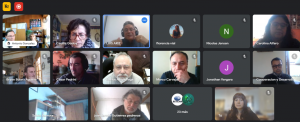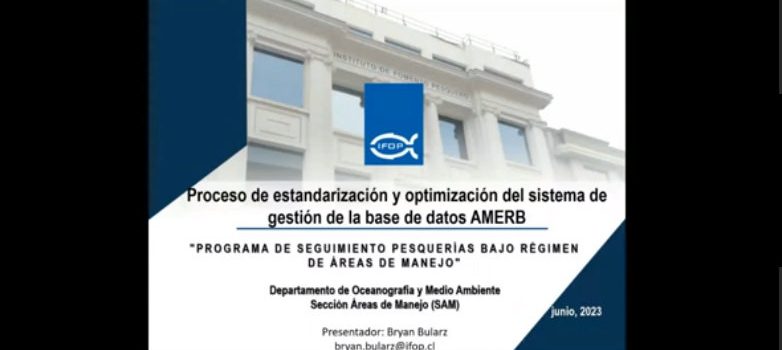“Collected information quality improvement actions in management areas” workshop
July 24th, 2023 Within the “Program for Monitoring Fisheries Under the Management Area Regime” framework, on June 29th, 2023, an important workshop was held which dealt with quality management of data and information generated in Benthic Resources Management and Exploitation Areas (AMERB) research. In almost 25 years of Management Areas regime development, technical organizations that advise artisanal fishermen’s organizations attached to this regime have generated a large number of reports and data records, thereby creating an unique opportunity to evaluate and to compare these areas evolution, as well as to verify main species population status. However, AMERB regime main species and management evaluation actions. Through information analysis from these studies, has been limited due to different methodologies use and ways of delivering data and information. The aforementioned led to the development of a process that would allow standards definition and control contribute to information quality improvement.
Within the “Program for Monitoring Fisheries Under the Management Area Regime” framework, on June 29th, 2023, an important workshop was held which dealt with quality management of data and information generated in Benthic Resources Management and Exploitation Areas (AMERB) research. In almost 25 years of Management Areas regime development, technical organizations that advise artisanal fishermen’s organizations attached to this regime have generated a large number of reports and data records, thereby creating an unique opportunity to evaluate and to compare these areas evolution, as well as to verify main species population status. However, AMERB regime main species and management evaluation actions. Through information analysis from these studies, has been limited due to different methodologies use and ways of delivering data and information. The aforementioned led to the development of a process that would allow standards definition and control contribute to information quality improvement.
The workshop resulted in an opportunity to disseminate results corresponding to a line of work related to AMERB database management system (BDA) standardization and optimization process and AMERB study quality control system relevant information for technical organizations. In addition to IFOP professionals presentations, Fisheries Undersecretariat Benthic Resources Unit (URB-SSPA), presented on advances and challenges from the perspective of the administration regarding AMERB quality information management research.
This workshop brought together around 30 technical organizations representatives linked to follow-up research execution required in AMERB regime. Among opinions and comments expressed by these representatives, the importance of considering the performance of artisanal fishermen’s organizations was highlighted, recognizing them as a fundamental element of AMERB regime success. In addition, it was noted that data and information contribution can go beyond accounting for management areas, being able to contribute with relevant information for climatic change impact evaluation. The need to advance in data and information collection that allows comprehensive management, oriented towards management with an ecosystemic approach, was also discussed, considering that AMERBs are part of a socio-ecological system.
Gabriela Arenas, researcher highlighted: “…the importance of generating these dissemination instances, since they contribute to awareness of those who are key actors in the collection of data and information, in addition to meaning an instance to receive tthose who work permanently with artisanal fishermen appreciations “. On the other hand, researcher Bryan Bularz pointed out that it is important to advance in standard procedures implementation that regulate the way in which data is collected in AMERB, which would allow restricting problems that have historically been repeated in the studies carried out in AMERB evaluations.
In her part, Cecilia Godoy, management areas research consultant , pointed out that: “It is good to share experiences between teams of professionals who are in the field with organizations and it is very important to rescue AMERBs organizational history and to have indicators that also show fishermen and their communities development and the incorporation of issues such as gender equality, climatic change and circular economy”.
Finally, Luis Ariz, IFOP’s Management Areas Section’s head , said that: “…workshops like these allow us to account for our advisory role to fishing authority on AMERB matters, in which IFOP has paid special attention to the quality of information from AMERB research, proposing standardized procedures for information and data sampling and delivery, so that a reliable evaluation of AMERB regime and specific studies of management areas is possible. A notable point addressed in the workshop was the need to understand AMERBs information gathering and evaluation, not only in consideration of fishing biological, having to highlight socio-economic and organizational aspects, areas that are observed to be weakened in their importance, and even more so if topics in vogue are added such as marine environment, climatic change, gender equality, among others… “.
